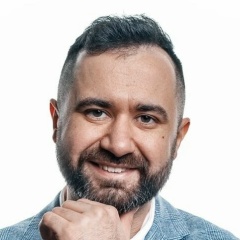"Когда и как учить ребёнка иностранному языку?”
- часто спрашивают меня приходящие ко мне на семинары родители. Мой обычный ответ - "Начните с себя”. К сожалению, немногие на это готовы, и чаще я слышу "Я не выучил, так пусть хоть ребёнок научится".
Я не могу похвастаться опытом обучения детей английскому с пелёнок, но вот умная статья http://bigthink.com/laurie-vazquez/the-sooner-you-expose-a-baby-to-a-second-language-the-smarter-theyll-be
говорит о том, что дети, растущие в многоязычном окружении, умнее “моноязычных” ещё до то того, как научатся говорить. То есть, если с ребёнком на разных языках разговаривать, он уже в возрасте меньше года начинает соображать лучше сверстников.
Авторы статьи наблюдали у детей-билингвов большую активность в префронтальной коре мозга, области, отвечающей за такие функции, как принятие решений, силу воли и регуляцию социального поведения. В общем, чем раньше ребёнок столкнётся иностранными языками, тем лучше. Лучше всего, по мнению авторов, работает метод “1 родитель - 1 язык”, но даже если такой возможности нет, можно смотреть что-нибудь на другом языке, или хотя бы учить отдельные слова так же, как это происходит с родным языком.
Повторюсь, что это только мои мысли, но считаю, что ключевую роль в изучении ребёнком иностранных языков должны играть родители, а не языковые детские сады и школы. И родители, которые ни одного иностранного языка не знают, очень мало могут сделать для превращения своего ребенка в полиглота.
Так что, дорогие (будущие) родители, учите иностранные языки, не ждите, что ребёнок сделает это за вас.
- часто спрашивают меня приходящие ко мне на семинары родители. Мой обычный ответ - "Начните с себя”. К сожалению, немногие на это готовы, и чаще я слышу "Я не выучил, так пусть хоть ребёнок научится".
Я не могу похвастаться опытом обучения детей английскому с пелёнок, но вот умная статья http://bigthink.com/laurie-vazquez/the-sooner-you-expose-a-baby-to-a-second-language-the-smarter-theyll-be
говорит о том, что дети, растущие в многоязычном окружении, умнее “моноязычных” ещё до то того, как научатся говорить. То есть, если с ребёнком на разных языках разговаривать, он уже в возрасте меньше года начинает соображать лучше сверстников.
Авторы статьи наблюдали у детей-билингвов большую активность в префронтальной коре мозга, области, отвечающей за такие функции, как принятие решений, силу воли и регуляцию социального поведения. В общем, чем раньше ребёнок столкнётся иностранными языками, тем лучше. Лучше всего, по мнению авторов, работает метод “1 родитель - 1 язык”, но даже если такой возможности нет, можно смотреть что-нибудь на другом языке, или хотя бы учить отдельные слова так же, как это происходит с родным языком.
Повторюсь, что это только мои мысли, но считаю, что ключевую роль в изучении ребёнком иностранных языков должны играть родители, а не языковые детские сады и школы. И родители, которые ни одного иностранного языка не знают, очень мало могут сделать для превращения своего ребенка в полиглота.
Так что, дорогие (будущие) родители, учите иностранные языки, не ждите, что ребёнок сделает это за вас.
“When and how to teach a child a foreign language?”
- Parents who come to me at seminars often ask me. My usual answer is “Start with yourself.” Unfortunately, few are ready for this, and more often I hear “I have not learned, so let the child learn at least.”
I can’t boast of learning English from the cradle of children, but here’s a clever article http://bigthink.com/laurie-vazquez/the-sooner-you-expose-a-baby-to-a-second-language-the-smarter -theyll-be
says that children growing up in a multilingual environment are smarter than “monolingual” even before they learn to speak. That is, if you speak different languages with a child, at the age of less than a year he begins to think better than his peers.
The authors of the article observed greater activity in bilingual children in the prefrontal cortex, the area responsible for such functions as decision making, willpower and the regulation of social behavior. In general, the sooner a child encounters foreign languages, the better. According to the authors, the method “1 parent - 1 language” works best, but even if this is not possible, you can watch something in another language, or at least learn individual words in the same way as it does with your native language.
I repeat that these are just my thoughts, but I believe that the key role in the child’s learning foreign languages should be played by parents, and not by language kindergartens and schools. And parents who do not know a single foreign language can do very little to turn their child into a polyglot.
So, dear (future) parents, learn foreign languages, do not expect the child to do this for you.
- Parents who come to me at seminars often ask me. My usual answer is “Start with yourself.” Unfortunately, few are ready for this, and more often I hear “I have not learned, so let the child learn at least.”
I can’t boast of learning English from the cradle of children, but here’s a clever article http://bigthink.com/laurie-vazquez/the-sooner-you-expose-a-baby-to-a-second-language-the-smarter -theyll-be
says that children growing up in a multilingual environment are smarter than “monolingual” even before they learn to speak. That is, if you speak different languages with a child, at the age of less than a year he begins to think better than his peers.
The authors of the article observed greater activity in bilingual children in the prefrontal cortex, the area responsible for such functions as decision making, willpower and the regulation of social behavior. In general, the sooner a child encounters foreign languages, the better. According to the authors, the method “1 parent - 1 language” works best, but even if this is not possible, you can watch something in another language, or at least learn individual words in the same way as it does with your native language.
I repeat that these are just my thoughts, but I believe that the key role in the child’s learning foreign languages should be played by parents, and not by language kindergartens and schools. And parents who do not know a single foreign language can do very little to turn their child into a polyglot.
So, dear (future) parents, learn foreign languages, do not expect the child to do this for you.

У записи 49 лайков,
6 репостов,
2964 просмотров.
6 репостов,
2964 просмотров.
Эту запись оставил(а) на своей стене Андрей Гуляев


















































![Юлия Март [Jull Mart] Юлия Март [Jull Mart]](https://sun9-3.vkuserphoto.ru/s/v1/ig2/IE8MuTB_UxbEVUQPpXcnDdPv9vk6UZ3h74udUTBY0c6SCRdD4DdRCMoyuH34sYm51wKqN9Ro8H_hoEbli1-35kQL.jpg?quality=95&crop=1,0,2025,2025&as=32x32,48x48,72x72,108x108,160x160,240x240,360x360,480x480,540x540,640x640,720x720,1080x1080,1280x1280,1440x1440&ava=1&cs=200x200)













![Евгения Акопова [949] Евгения Акопова [949]](https://sun9-38.vkuserphoto.ru/s/v1/ig1/cx0nHyMeLFYZfikdmLpDlbTmgfg5dmw2_qMOUQ6q4fEF80dWUoPvPahO1RMWspjL3ZqQGc5W.jpg?quality=96&crop=143,143,793,793&as=32x32,48x48,72x72,108x108,160x160,240x240,360x360,480x480,540x540,640x640,720x720&ava=1&cs=200x200)


